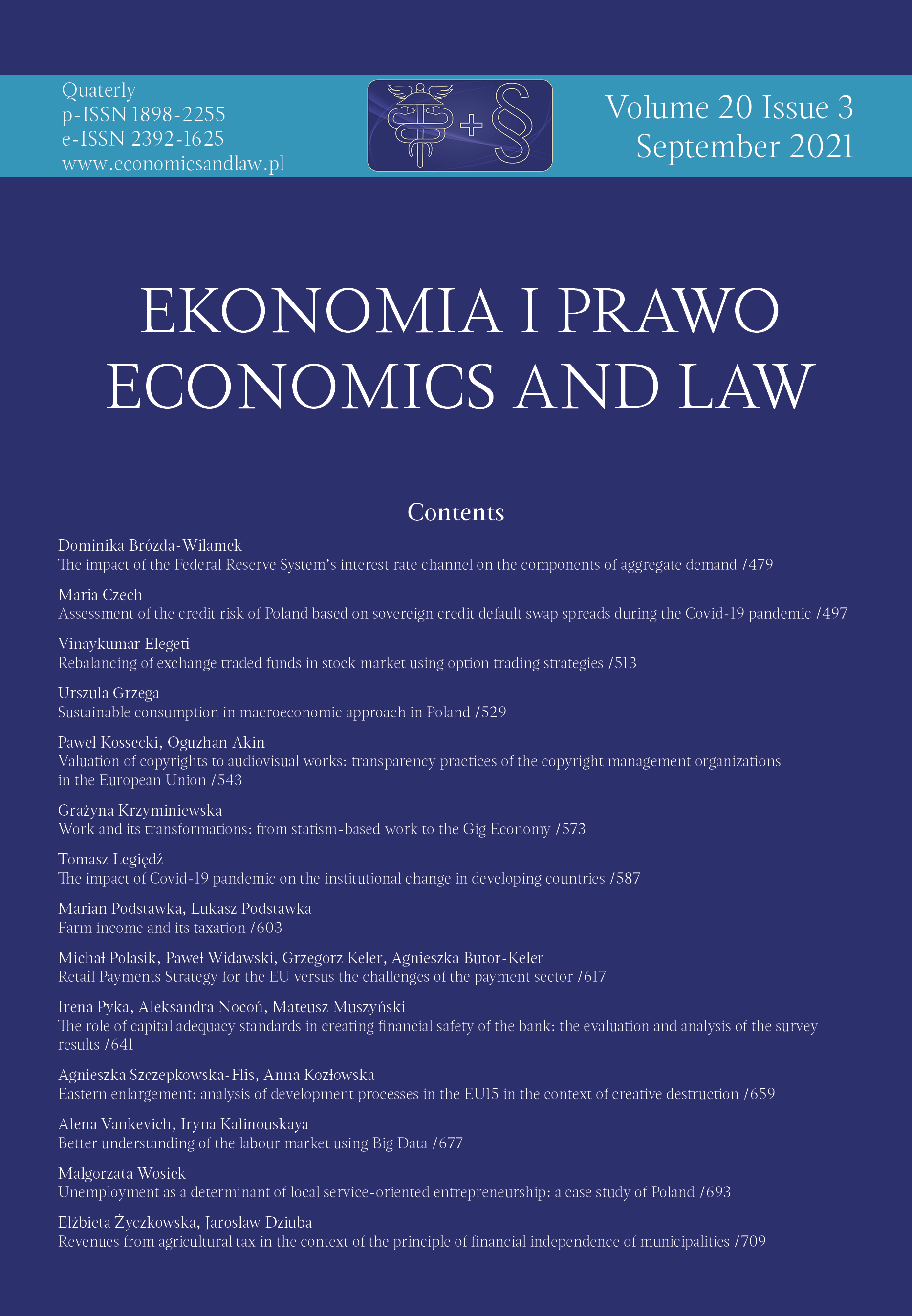Sustainable consumption in macroeconomic approach in Poland
DOI:
https://doi.org/10.12775/EiP.2021.032Keywords
sustainable consumption, sustainable consumption indicators, sustainable economic development, PolandAbstract
Motivation: The studies on sustainable consumption are conducted in Poland and worldwide on the basis of various source data. Macroeconomic perspective is one of research approaches. The data obtained from the system of national accounts are especially important for the assessment of the situation in Poland. As a result of research specific indicators are obtained which express changes in various areas of functioning of consumption entities in the perspective of sustainable consumption.
Aim: to indicate the main trends of research on sustainable consumption in macroeconomic approach in Poland and to recognise the changes in the area of sustainable consumption on the basis of indicators adopted in the research on sustainable development conducted by Central Statistical Office.
Results: In Polish official statistics, the process of tracing sustainable development which includes sustainable consumption as an integral part, can be conducted with the use of the set of indicators monitoring four main orders, i.e. social, economic, environmental and institutional, as well as political order. Indicators related to the patterns of sustainable consumption are located in the group of indicators of social order and include such measures as the structure of average monthly expenditure per capita in households by type, the structure of passenger cars by age groups and electricity consumption in households per capita. Conducted research shows that in the years 2004–2019 favourable changes were reported in Poland in the structure of individual consumption in the household sector. They were related to the decrease in the value of the food index and the increase in the expenditures free choice indicator. At the same time, the data from Central Statistical Office shows that a regression was observed in the other two research areas, i.e. the structure of passenger cars by age and energy consumption in households.
References
Bartolj, T., Murovec, N., & Slabe-Erker, R. (2018). Development of a Household Sustainable Consumption Index and its application to EU–28. Sustainable Development, 26(1), 34–50. https://doi.org/10.1002/sd.1689.
Caeiro, S., Ramos, T., & Huisingh, D. (2012). Procedures and criteria to develop and evaluate household sustainable consumption indicators. Journal of Cleaner Production, 27, 72–91. https://doi.org/10.1016/j.jclepro.2011.12.026.
Czechowska, E. (2021). Wiek samochodów w Europie: jak na tle innych krajów wypada Polska. Retrieved 17.11.2021 from https://www.auto-swiat.pl/wiadomosci/aktualnosci/wiek-samochodow-w-europie-jak-wypada-polska/h9jy55p.
Engelbrecht, H. (2014). A comparison of macro-level sustainability indices for OECD countries: conceptual and measurement issues. Economic Papers: A Journal of Applied Economics and Policy, 33(2), 137–152. https://doi.org/10.1111/1759-3441.12073.
Eurostat. (2019). Sustainable development in the European Union: monitoring report on progress towards the SDGs in an EU context. https://doi.org/10.2785/44964.
Eurostat. (2021a). Final consumption expenditure of households, by consumption purpose. Retrieved 17.11.2021 from https://ec.europa.eu/eurostat/databrowser/view/tec00134/default/table?lang=en.
Eurostat. (2021b). Final energy consumption in households per capita. Retrieved 17.11.2021 from https://ec.europa.eu/eurostat/databrowser/view/sdg_07_20/default/table.
Grzega, U. (2020), Zrównoważenie konsumpcji w ujęciu makroekonomicznym. In S. Smyczek (Ed.), Zrównoważona konsumpcja w polskich gospodarstwach domowych: postawy, zachowania, determinant (pp. 66–96). Uniwersytet Ekonomiczny w Katowicach.
GUS. (2013; 2015a; 2017a; 2019a). Transport drogowy w Polsce. Retrieved 27.09.2020 from https://stat.gov.pl/obszary-tematyczne/transport-i-lacznosc/transport/transport-drogowy-w-polsce-w-latach-2018-i-2019,6,6.html.
GUS. (2015b). Wskaźniki zrównoważonego rozwoju Polski 2015. Retrieved 27.09.2020 from https://stat.gov.pl/obszary-tematyczne/inne-opracowania/inne-opracowania-zbiorcze/wskazniki-zrownowazonego-rozwoju-polski-2015,5,2.html
GUS. (2016; 2017b; 2018; 2019b; 2020a). Energia. Retrieved 27.09.2020 from https://stat.gov.pl/obszary-tematyczne/srodowisko-energia/energia.
GUS. (2020b). Cel 12: odpowiedzialna konsumpcja i produkcja. Retrieved 27.09.2020 from http://sdg.gov.pl/statistics_nat/12-1-b.
GUS. (2020c). Priorytety krajowe SDG. Retrieved 25.11.2021 from https://sdg.gov.pl/priorytet.
GUS. (2020d). Rocznik statystyczny RP 2020. Retrieved 27.09.2020 from https://stat.gov.pl/download/gfx/portalinformacyjny/pl/defaultaktualnosci/5515/2/20/1/rocznik_statystyczny_rzeczypospolitej_polskiej_2020_korekta_30.09.2021.pdf.
GUS. (2021). Wskaźniki makroekonomiczne. Retrieved 17.11.2021 from https://stat.gov.pl/wskazniki-makroekonomiczne.
Jaros, B. (2014). Pomiar zrównoważonej konsumpcji. Optimum: Studia Ekonomiczne, 3(69), 169–183. https://doi.org/10.15290/ose.2014.03.69.11.
Jaros, B. (2016). Bariery i pozytywne tendencje w rozwoju zrównoważonej konsumpcji w Polsce. Ekonomia i Środowisko, 2(57), 24–36.
Khan, M. (2015). Putting ‘good society’ ahead of the economy: overcoming neoliberalism’s growth trap and its costly consequences. Sustainable Development, 23(1), 55–63. https://doi.org/10.1002/sd.1571.
Kieżel, E., & Grzega, U. (2018). Wydatki konsumpcyjne polskich gospodarstw domowych jako miara rozwoju gospodarki. In K. Żyminkowska (Ed.), Nowe koncepcje w nauce o marketingu i rynkach (pp. 89–100). Uniwersytet Ekonomiczny w Katowicach.
Murovec, N., Slabe Erker, R., & Bartolj, T. (2016). Rankings and comparisons of Slovenia by alternative development indices. IER Working Paper, 89, 1–22.
Rada Ministrów RP. (2018). Realizacja celów zrównowazonego rozwoju w Polsce. Retrieved 21.02.2021 from http://unic.un.org.pl/files/259/Polska_VNR_20180615.pdf.
Schoenaker, N., Hoekstra, R., & Smits, J. (2015). Comparison of measurement systems for sustainable development at the national level. Sustainable Development, 23(5), 285–300. https://doi.org/10.1002/sd.1585.
Downloads
Published
How to Cite
Issue
Section
License
Copyright (c) 2022 Urszula Grzega

This work is licensed under a Creative Commons Attribution-NoDerivatives 4.0 International License.
Stats
Number of views and downloads: 726
Number of citations: 0
